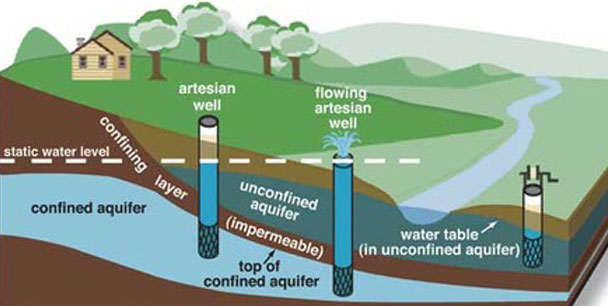Geokonsult is involved in the identification, evaluation and development of new and existing groundwater sources, as well as in defining long term monitoring and management actions required to ensure the sustainable use and protection of resources.
Groundwater services include-
- Groundwater feasibility studies
- Exploration for groundwater sources, incorporating the
evaluation of aquifer potential
- Geological and Geophysical surveys
- Aquifer testing to determine hydraulic parameters and
long-term abstraction
- Aquifer classification and vulnerability assessments
- Groundwater quality determination and monitoring
- Soil Investigations
-
- Numerical Groundwater modelling
- Groundwater Quality Analysis
- Development of conceptual groundwater models
- Determination of sustainable groundwater supply volumes
- Groundwater inflow rates and mine dewatering design
- Site selection of waste sites and tailings dams
- Modelling of groundwater flow rate and direction and
contaminant migration rates
Groundwater as a dependable source and its proximity to various users has led to indiscriminate extraction of this precious natural resource for agricultural, domestic and industrial uses. The intensive ground water development has resulted in depletion in water levels, deterioration in water quality and availability of this scarce resource. The development of groundwater resources need to be regulated and augmented through suitable measures to provide sustainability. Rainfall being the main source of recharge to groundwater, it is essential that substantial volumes of surplus monsoon run-off that flows out or wasted has to be conserved and recharged to groundwater reservoir.
Purpose of Artificial Recharge or Rainwater Harvesting
- To enhance the sustainable yield in areas where over-development has depleted the aquifer.
- Conservation and storage of excess surface water for future requirements, since these requirements often changes within a season or a period.
- To improve the quality of existing ground water through dilution.
- To remove bacteriological and other impurities from sewage and waste water so that water is suitable for re-use.
Methodology & Results
To ensure the effective and efficient operation of an artificial recharge system, thorough and detailed scientific studies such as Hydrometrorological, Hydrogeological, Soil infiltration and Geophysical surveys must be conducted before selecting the site and method of recharge. In particular, the following basic factors be analyzed: climate and rainfall of the area, the locations of geologic and hydraulic boundaries; the transmissivity, depth to the aquifer and lithology, storage capacity, porosity, hydraulic conductivity, and natural inflow and outflow of water to the aquifer; the availability of land, surrounding land use and topography; the quality and quantity of water to be recharged; availability of surplus surface water. With the help of these data, we can able to recommend the best possible way of Artificial Recharge at your location by Recommending Percolation tanks, Recharging Existing wells etc...

